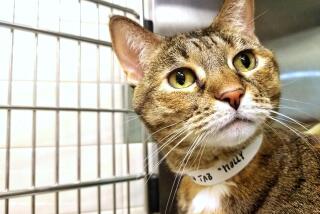Mr. Kitty Litter : Ed Lowe, Cat Box Pioneer, Sticks His Neck Out for Trademark
CASSOPOLIS, Mich. — Forty-two years after giving a friend a bag of clay to try in her cat box, Ed Lowe has become a celebrity of sorts, his white-bearded, grandfatherly image recognized by millions of feline fanciers.
The inventor of cat box filler obtained a trademark for “Kitty Litter” back then, but only within the last two years has his face begun appearing on the packaging.
Now, people occasionally stop the 68-year-old Lowe on the street--but not always to ask about him.
“One day I was walking down the street and this guy walked by and looked at me and asked, ‘How’s Ugh?”’ Lowe said, referring to his pet cat who appeared with him on television commercials. “So I guess they know Ugh better than they know me.”
The self-made millionaire doesn’t mind the attention. In fact, he relishes making the most of his caring image as “the man who brought the cat in from the cold.”
A new cat food expected on supermarket shelves in February or March--the first for Edward Lowe Industries Inc.--also will bear his picture.
“We’re going to promote the character of Ed Lowe a little more, because no one else can do that,” Lowe said during an interview at the 3,000-acre farm in southwestern Michigan, where he lives and conducts business as chairman and chief executive of the company he founded.
Two cats roam the offices, which resemble a tasteful country inn more than the headquarters of a company with annual revenues of $150 million. The sales offices are about 20 miles away in South Bend, Ind.
100 Cats at Center
Lowe, dressed in corduroys, a red sweater and matching bandanna, drinks coffee from a cat coffee mug and is surrounded by a host of cat sculptures, paintings--even a stuffed toy cat that moves its head.
More than a hundred cats are housed in Lowe’s cat care center, where cat box filler and food preference are studied. The cats are kept either individually in small, glass-enclosed rooms or in groups of 10 or 20 in larger rooms, where behavior is monitored.
Despite appearances, Lowe says he’s never been crazy about cats--especially when he gave out that first bag of clay.
“I didn’t dislike them,” Lowe said. “I wasn’t and I’m still not a fanatic about any pet.”
Chickens were on Lowe’s mind in 1946 when he began trying to market granulated clay to poultry farmers as a nesting material. When Chicken Litter failed to catch on, Lowe returned to his father’s sawdust business in Vandalia, Mich., which sold the absorbent clay to soak up oil and grease.
On a cold day in January, 1947, a friend of Lowe’s, Kay Draper, approached him for some sand for her cat box. Because all the sand at the sawdust business had frozen, Lowe instead gave her a bag of the clay.
Word spread, and before long Lowe was peddling his Kitty Litter from the trunk of his ’43 Chevy to pet shops and at cat shows across the country.
“If I hadn’t seen Kay that day, I’d still be shoveling sawdust,” Lowe says with a laugh.
For more than 10 years, Lowe was alone in the cat litter business.
Today, Lowe Industries is the leader in what has grown to be a $600-million industry. Between Kitty Litter, which retails for $1.89 for an 8-pound bag, and his less expensive cat box filler, Tidy Cat, Lowe says he controls about 40% of the market.
He employs 500 people at five plants in Missouri, Illinois, California and Tennessee--where clay deposits are plentiful.
Despite his success, Lowe still fights the use of Kitty Litter as a generic term.
“I have the same problem as Kleenex. You just gotta keep fighting it,” Lowe says. However, he calls the dilemma “a joyful problem. I would rather have it that way than not have it at all.”
Lowe hopes to advance that cause by putting his face on all of his products. He also hopes that by familiarizing consumers with his picture he will capture their trust.
He wants to become to cat box filler what Col. Sanders is to fried chicken and Orville Redenbacher is to popcorn.
Though corporate strategy is to promote a gentle, grandfatherly image, Lowe isn’t shy about taking credit for establishing an industry. He figures the hugely competitive cat food business and veterinary practices are outgrowths of his product.
“I think that I’ve made the cat popular,” Lowe says. “You wouldn’t be able to own a cat if you didn’t have Kitty Litter.”
Lowe also has started a foundation at his farm to support partnership programs for owners of family and independent businesses.
“Building a foundation allows you to go on forever and my mission is to help entrepreneurs,” Lowe said.
“This property will be given to the foundation when I go to the great cat box in the sky.”
More to Read
Sign up for Essential California
The most important California stories and recommendations in your inbox every morning.
You may occasionally receive promotional content from the Los Angeles Times.










